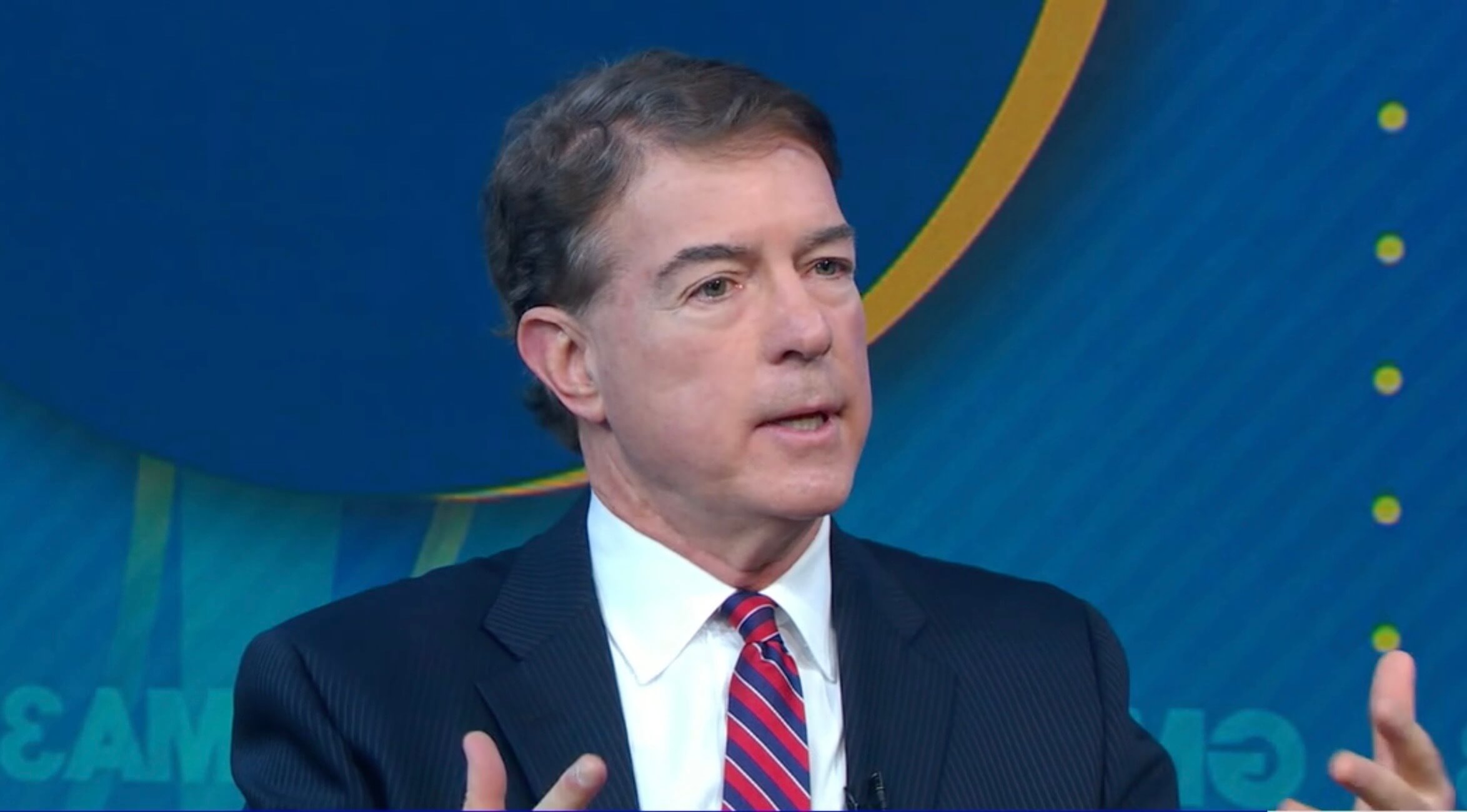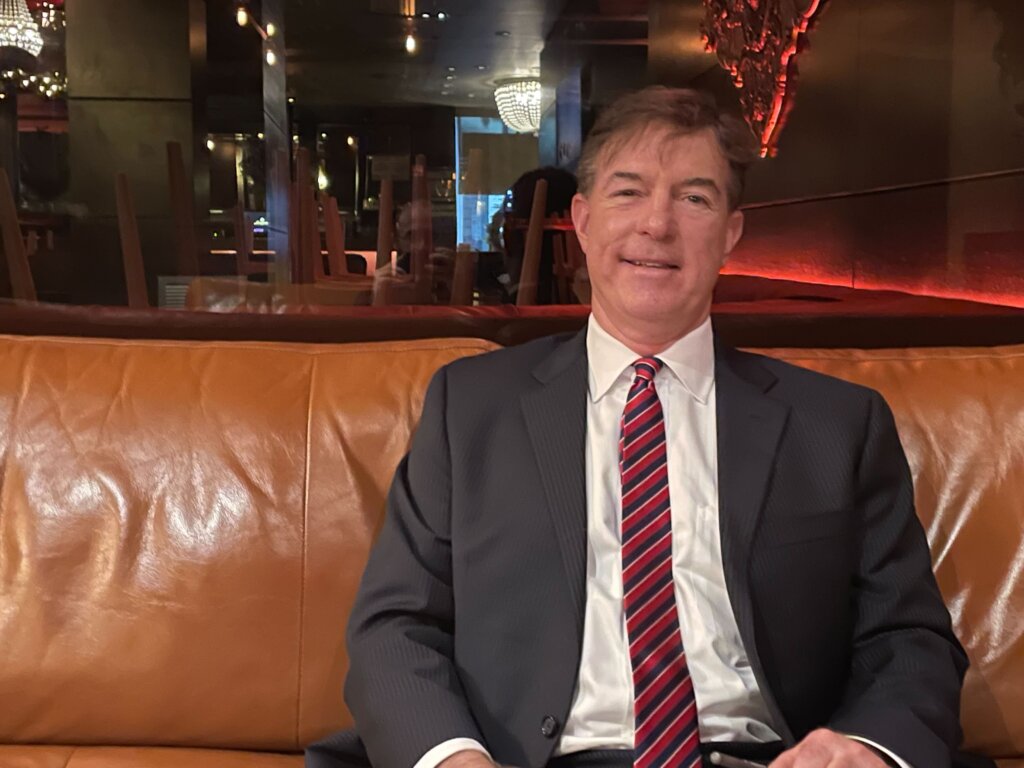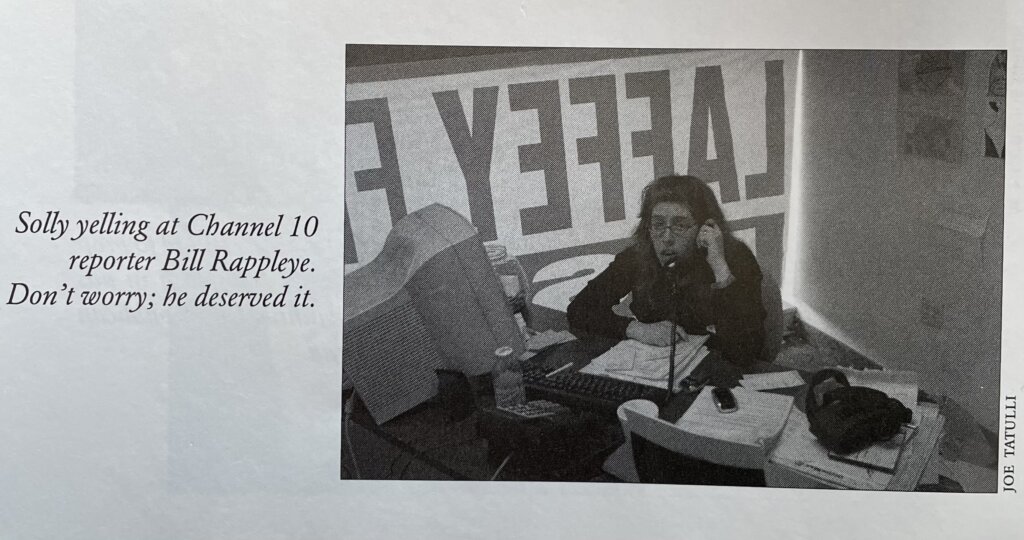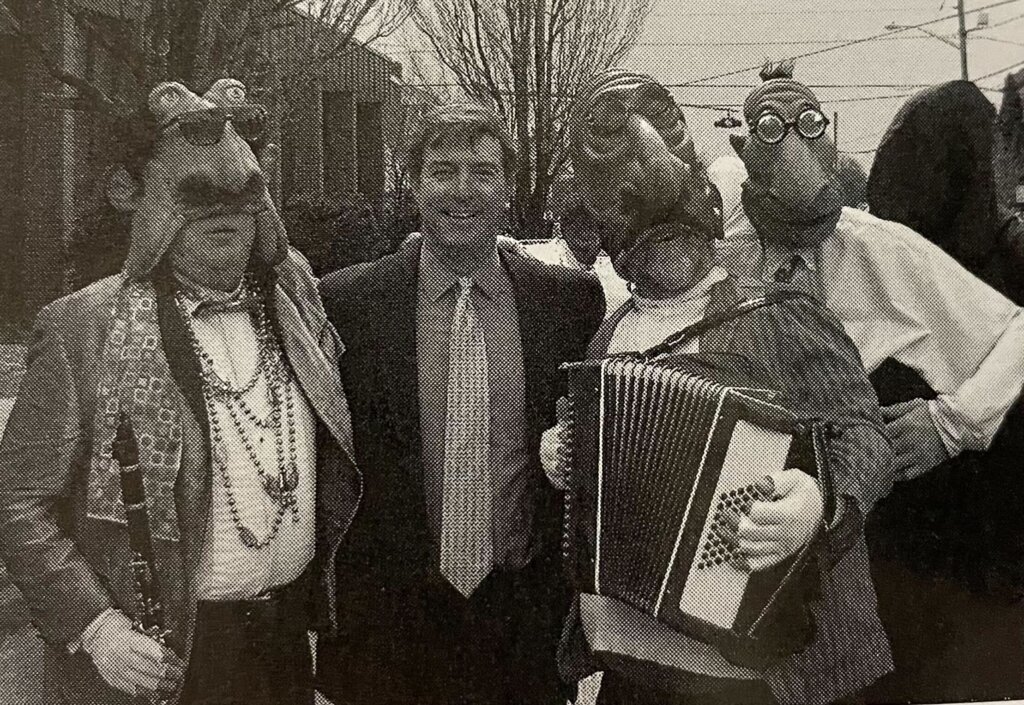Trump’s first GOP challenger can’t say enough about his Jewish friends — and Israel
Steve Laffey professes a love for the Jewish state but questions Palestinian peoplehood

Steve Laffey, a 2024 presidential candidate, on ABC’s Good Morning America program on Feb. 7, 2023. Courtesy of Good Morning America (screenshot)
To prove his pro-Israel bona fides, Colorado Republican Steve Laffey, the first in his party to challenge former President Donald Trump for the 2024 presidential nomination, recalls a college class he and his Jewish roommate took on the Israeli-Palestinian conflict.
“We only took the Israeli side,” he said of their debates with pro-Palestinian students at Bowdoin College.
Laffey, 62, the former mayor of Cranston, Rhode Island, who narrowly lost a Republican primary to Sen. Lincoln Chafee in 2006 and lost a bid for Congress in 2014, announced that he is running for president last week. Days later, in an interview with the Forward, he reeled off a long list of Jewish friends, confidants and advisers, and emphasized his devotion to Israel, which he has never visited because he was preoccupied with work and his daughter’s battle with cancer. He is hawkish on the Jewish state to the point that he expressed doubt over the existence of a Palestinian people, and labeled liberal Jews who critique the Jewish state as “self-loathing.”
Laffey said what distinguishes him from others in the Republican pack is that he never supported Trump. Former South Carolina Gov. Nikki Haley is expected to formally announce her presidential candidacy on Feb. 15. Yet to declare a presidential bid: former Vice President Mike Pence, former Secretary of State Mike Pompeo, Florida Gov. Ron DeSantis, and U.N. Ambassador John Bolton.
An evangelical Christian, Laffey now lives with his wife Kelly and six children in Fort Collins, Colorado, on a small ranch where they raise cattle and other animals. He said he disagreed with Trump’s fiscal policy — and refused to condone his reckless behavior. He said he would shun extremist factions within his party, but doesn’t consider himself a member of the “Never Trump” movement. He said he voted for Laurence Kotlikoff, a Jewish economist who ran as a write-in candidate in 2016, and wrote in his own name on the 2020 ballot.
“I can understand why Trump is really upset” at his other possible challengers, Laffey said, because each either sought Trump’s support or served in his administration. “It seems to be like, did you say nothing, or did you totally agree with him? And why are you running if you totally agree with him?” he asked.
Laffey, who made a documentary in 2012 called Fixing America, said he will move this summer to New Hampshire, one of the early primary states, where he hopes to debate Trump on economics and conservative values.
Jewish buddies
Growing up in Cranston as the son of a toolmaker, Laffey — who spoke to the Forward on the phone and in person on a visit to New York last week — said he has made fast friends with Jews from the time he was a child growing up in Rhode Island, where close to 2% of the population is Jewish. Those friends and mentors, he said, shaped his understanding of Judaism and his love for Israel.

His 12th-grade buddy was Daniel Orodenker, who now lives in Hawaii and is the brother of the late Norman Orodenker, a well-known leader in the Rhode Island Jewish community. Laffey said he “kind of grew up” with the Orodenker kids and parents, and that Anna Orendenker was a mother figure to him.
Laffey credits his Jewish high school economics teacher, Paul Zisserson, for introducing him to the market-based ideas of Milton Friedman.
His best friend and roommate at Bowdoin, in Brunswick, Maine, with whom he said he debated pro-Palestinian students, is Jonathan Newman, son of Sandra Schultz Newman, a former Pennsylvania Supreme Court Justice. She came under fire in the 2008 presidential election for signing an email to Jewish voters that likened a vote for Barack Obama, the Democratic nominee, to ignoring warning signs before the Holocaust. She apologized and blamed the language on a Republican consultant.
Laffey said he and Newman still talk every day. “My kids call him uncle Jonathan,” he said.
Other Jewish friends Laffey mentioned were Alan Levow, who was on the American Israel Public Affairs Committee’s board of directors; and Jeremy Friedman of Canada, whom he knows from Harvard Business School.
Laffey is a longtime fan of AIPAC. Sixteen years ago, he attended an AIPAC policy conference in Washington, D.C., and was so impressed with the program, quipped publicly, “I wouldn’t mind if they ran part of our government.”
When Laffey decided to run for Cranston’s mayor in 2002, Norman Orodenker and Paul Zisserson served as his senior advisers. Another Jewish friend, Evan Kirshenbaum, headed the campaign. They joined him for his 2006 Senate campaign.
Laffey staffers now with Haley
Both of Haley’s current senior and Jewish advisers on her presidential campaign, Jon Lerner and Nachama Soloveichik, also worked on Laffey’s 2006 Senate campaign.
Laffey said that during a presentation on taxes during that race, flanked by his Jewish advisers, a local political columnist, Charlie Bakst, who is Jewish and wrote for The Providence Journal, asked him why there were so many Jews on his campaign. He recalled that Orodenker scolded Bakst, and Laffey said he explained that he supports Israel simply because it’s the promised homeland of the Jews and America’s only democratic ally in the Middle East.
In his book 2007 book, Primary Mistake: How the Washington Republican Establishment Lost Everything in 2006, Laffey wrote that every time he met a Jewish person on the campaign trail, he asked whether they had met his press secretary, but struggled to correctly pronounce the Hebraic “ch” of her first name. Soloveichik is the scion of the Soloveichik Orthodox rabbinic dynasty, and the sister of Rabbi Meir Soloveichik.

“All heads would turn,” he wrote. “For the Jews, it was like having Babe Ruth’s granddaughter around.” Her official name on the campaign was “Solly,” her nickname from when she played high school basketball.
He recalled in the interview that his family kept a special blender at their home for Soloveichik, who keeps kosher, to use for her shakes and that she used to warm up her fish dishes wrapped in foil on a portable radiator because she wasn’t able to use the unkashered appliances in the kitchen. One of the photos he shared in the book is him marching with her in the local Providence Purim Parade, though neither wore a costume.

Haley has just named Soloveichik her communications director.
Enthused about Israel
Haley is considered a star in the pro-Israel community. But Laffey said he would outshine her. A first trip to Israel is also on his mind.
He is dismissive of the Palestinian cause, and questioned the term “Palestinian people.”
“I don’t really think the Palestinians are Palestinians,” he said. “I think they lost the war. No one would let them in. They fought against Israel, and I wouldn’t really refer to it like that.”
As for the conflict with Israeli-Palestinian conflict, he said “I personally think that there will never be peace,” and added that he would never let Israel give back land they occupied during the 1967 war. In 2014, Laffey hosted an hourlong radio show in which he discussed Israeli Prime Minister Ariel Sharon’s legacy and criticized his disengagement from Gaza in 2005.
He also, to the Forward, repeated a claim made by Trump and other Republicans that liberal Jews, critical of Israel, “have lost their way” and are “self-loathing.”
Differences over policy in the Middle East are understandable, Laffey said, but it must be recognized that “Israel is our one real ally in the Middle East,” and that Jews “lost 6 million people and they needed a homeland.”
Laffey said he supported Trump’s Israel policy, particularly the relocation of the U.S. embassy to Jerusalem. But he disagreed with the suggestion, made by Trump himself, that the move was to satisfy his evangelical base. “Jews are the chosen people,” he said. “It was just the right place and the right time. And as an American, I think that’s where it should be.”
Laffey said that if he wins the nomination he would reject those on the extreme right in his party who claim the 2020 election was stolen and invoke conspiracy theories and antisemitic tropes.
“Those people have to be told to the face: ‘Shut up,’” he said. “Those who have hatred for certain groups of people — Jews, Blacks or anything — they can’t be in our party. They’re excommunicated from day one. They are not part of my party.”
A message from our Publisher & CEO Rachel Fishman Feddersen

I hope you appreciated this article. Before you go, I’d like to ask you to please support the Forward’s award-winning, nonprofit journalism so that we can be prepared for whatever news 2025 brings.
At a time when other newsrooms are closing or cutting back, the Forward has removed its paywall and invested additional resources to report on the ground from Israel and around the U.S. on the impact of the war, rising antisemitism and polarized discourse.
Readers like you make it all possible. Support our work by becoming a Forward Member and connect with our journalism and your community.
— Rachel Fishman Feddersen, Publisher and CEO





























